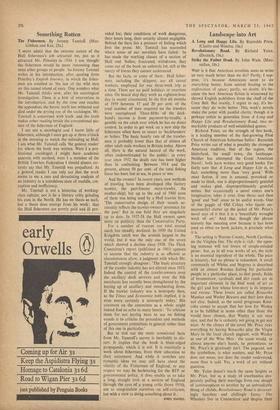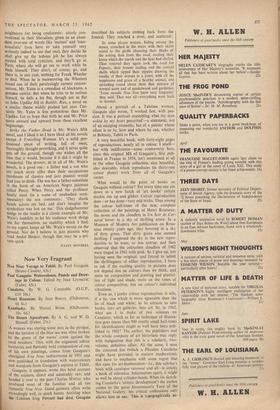Landscape into Art
Revolutionary Road. By Richard Yates. (Deutsch, 18s.) Strike the Father Dead. By John Wain. (Mac- millan, 18s.) WHY is it that American novelists seem to write so very much better than we do? Partly, I sup- pose, it's because Americans seem to do everything better, from central heating to the exploration of space; partly, no doubt, it's be- cause the best American fiction is winnowed by shrewd English publishers from the chaff of the Corn Belt. But mainly, I regret to say, it's be- cause they do write better. This week's novels make the point with painful clarity, though it is perhaps unfair to generalise from A Long and Happy Life and Revolutionary• Road, two re- markable products of well-established genres.
Richard Yates, on the strength of this book, is a leading member of the fast-growing First Church of American Suburban Satire: Reynolds Price writes out of what is possibly the strongest American tradition, that of the region, the hinterland, the small town, the landscape. Neither has attempted the Great American Novel: both have written very good books. I'm fairly sure that A Long and Happy Life is, in fact, something more than 'very good.' With most fiction, if one is amused, provoked or made to think, one is disproportionately grateful and makes glad, disproportionately grateful noises. But occasionally a novel enters one's imagination, takes it over, lives there; and then 'good' and 'bad' cease to be useful words. One of the gaggle of Old Critics who (quite un- necessarily) clutter up the jacket of Mr. Price's novel says of it that it is a 'beautifully wrought work of art.' And that, though the phrase scarcely has meaning now because it has been used so often on book jackets, is precisely what it is.
The setting is Warren County, North Carolina, on the Virginia line. The style is rich: the open- ing sentence will test lovers of simple-minded prose: but, as in all true works of art, the style is an essential ingredient of the whole. The pace is leisurely, but no phrase is redundant. A small community of Whites and Negroes is described with an almost Russian feeling for particular people in a particular place, so that ponds, fields of broomstraw, cardinals and dirt roads are as important elements in the final work of art as the girl and boy whose love-story is its impetus and excuse. These lovers are called Rosacoke Mustian and Wesley Beavers and their love does not cloy. Indeed, as the novel progresses Rosa- coke comes to accept that her love for Wesley is to be fulfilled in terms other than those she would have chosen, that Wesley is not very nice, and that he is certainly not going to get any nicer. At the climax of the novel Mr. Price risks everything by having Rosacoke play the Virgin Mary in the local church pageant, with Wesley as one of the Wise Men : the scene would, in almost anyone else's hands, be pretentious; in Mr. Price's it gloriously isn't. The pageant, not the symbolism, is what matters, and Mr. Price does not mean, nor does the reader understand, more than is said. Yes, a work of art, without question.
Mr. Yates doesn't reach the same heights as Mr. Price, but as a study of exurbanites des- perately pulling their marriage from one slough of commonplaces to another by an unbreakable thong of clichés, Revolutionary Road is devastat- ingly heartless and chillingly funny. The Wheelers live in Connecticut and despise their
neighbours for being conformist: utterly con- ventional in their liberalism, given to an abun- dant over-use of words like `mature' and `emo- tionalistic' (you have to take yourself very seriously indeed to use that one), they decide he shall give up the tedious job he has always treated with total cynicism, and they'll go to Paris, where she will go out to work while he finds himself. They don't, of course, go, and there is, in any case, nothing for Frank Wheeler to find. When he is manoeuvring the Wheelers round one of their paralysingly earnest conver- sations, Mr. Yates is a comedian of blackness, a genuine satirist. But when he tries to be serious himself, he falls a bit flat, though not as flat as John Updike fell in Rabbit, Run, a novel on a similar theme widely praised last year. Cer- tainly Mr. Yates is less pretentious than Mr. Updike. Let us hope that both he and Mr. Price move onward and upward from these excellent beginnings.
Strike the Father Dead is Mr. Wain's fifth novel, and I liked it as I have liked all his novels except A Travelling Woman. It's a solid pro- fessional piece of writing, full of meat, thoroughly thought-provoking, and it never quite gets off the ground, though one wishes all the time that it would, because if it did it might be wonderful. The donnee, as in all of Mr. Wain's novels, is a good one: a father and a son who are much more alike than their occupations (professor of classics and jazz pianist) would lead you to think. The son has a father-substitute in the form of an American Negro jazzman called Percy. When Percy and the professor finally meet (in a scene of unabashed senti- mentality) the son comments : `They shook hands across my bed, and don't imagine the symbolism was lost on me.' This sledgehammer nudge to the reader is a classic example of Mr. Wain's inability to let his audience work things out for themselves, an inability which I find, to my regret, keeps all Mr. Wain's novels on the ground. Nor do I believe in jazz pianists who read Andre Hodeir, though that may be a pri- vate quirk.
JULIAN MITCHELL



































 Previous page
Previous page